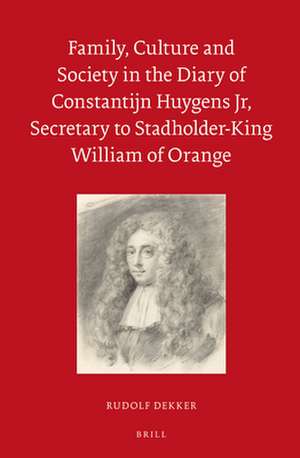Family, Culture and Society in the Diary of Constantijn Huygens Jr, Secretary to Stadholder-King William of Orange: Egodocuments and History Series, cartea 5
Autor Rudolf M. Dekkeren Limba Engleză Hardback – 6 iun 2013
Preț: 615.38 lei
Preț vechi: 750.47 lei
-18% Nou
Puncte Express: 923
Preț estimativ în valută:
117.79€ • 127.99$ • 99.01£
117.79€ • 127.99$ • 99.01£
Carte indisponibilă temporar
Doresc să fiu notificat când acest titlu va fi disponibil:
Se trimite...
Preluare comenzi: 021 569.72.76
Specificații
ISBN-13: 9789004250949
ISBN-10: 9004250948
Pagini: 195
Dimensiuni: 155 x 235 x 17 mm
Greutate: 0.46 kg
Editura: Brill
Colecția Brill
Seria Egodocuments and History Series
ISBN-10: 9004250948
Pagini: 195
Dimensiuni: 155 x 235 x 17 mm
Greutate: 0.46 kg
Editura: Brill
Colecția Brill
Seria Egodocuments and History Series
Cuprins
List of Illustrations
Introduction
1. Constantijn Huygens Jr
2. Diary-Writing and Time-Keeping
3. The Glorious Revolution of 1688
4. The Nine Years' War
5. Dutchmen and Englishmen
6. The Many Faces of William of Orange
7. Connoisseur of Art
8. The Bibliotheca Zuylichemiana
9. Quacks and Witches
10. Gossip and Sex
11. Servants and Maids
12. The Last Generation
13. The Court as a Microcosm
Index of Names
Index of Places
Introduction
1. Constantijn Huygens Jr
2. Diary-Writing and Time-Keeping
3. The Glorious Revolution of 1688
4. The Nine Years' War
5. Dutchmen and Englishmen
6. The Many Faces of William of Orange
7. Connoisseur of Art
8. The Bibliotheca Zuylichemiana
9. Quacks and Witches
10. Gossip and Sex
11. Servants and Maids
12. The Last Generation
13. The Court as a Microcosm
Index of Names
Index of Places
Recenzii
"Rudolf Dekker does a good job of handling this text, which is both complex, and difficult […]. The personal angle of the document opens an entirely new view of familiar events and characters […]. The book demonstrates the huge importance that sources such as egodocuments can have for historical research […]. I would recommend [the] book to all historians…" S. Gylfi Magnússon. In: Journal of Social History.
‘’Rudolph Dekker’s book on the diary of Constantijn Huygens Jr offers its reader an accessible and enjoyable introduction to Dutch and English court life in the late seventeenth century. It will appeal to interested laypersons, and will serve well as a prescribed text for undergraduate students or as a point of reference for further reading for postgraduates and researchers […] this book is to be recommended to university libraries, lecturers, and tutors of early modern studies, and certainly to anyone with a professional or personal interest in this period of European history.’’
Christian Thorsten Callisen, University of Queensland. In: Parergon, 31, 2, 2014, p. 223-4.
“[Huygens’s diary] is a rich and fascinating source, and this volume by Rudolf Dekker does a highly useful job of advertising it.”
Tony Claydon, Bangor University. In: SHARP News, Vol. 23, no. 1 (Winter 2014), p. 6.
‘’In summarizing the contents of an important and understudied manuscript, and bringing it to the attention of English readers, Dekker has done a real service. As scholarly interest in later-seventeenth and eighteenth-century Dutch visual culture continues to grow, so, too, will the importance of Constantijn Huygens Jr. as a commentator on the arts and patronage of the time. This book should be a reference point for anyone concerned with early modern court culture, and especially with the complex history of cultural exchange between the Netherlands and Britain.’’
Stephanie S. Dickey, Queen’s University. In: Historians of Netherlandish Art, 31, 1, 2014, p. 36.
‘’Dekker is an ambassador for his main source, and he does not fail to show its richness and attractions.’’
Helmer Helmers, University of Amsterdam. In: Reviews in History (Institute of Historical Research, University of London), http://www.history.ac.uk/reviews/review/1508
‘’Rudolph Dekker’s book on the diary of Constantijn Huygens Jr offers its reader an accessible and enjoyable introduction to Dutch and English court life in the late seventeenth century. It will appeal to interested laypersons, and will serve well as a prescribed text for undergraduate students or as a point of reference for further reading for postgraduates and researchers […] this book is to be recommended to university libraries, lecturers, and tutors of early modern studies, and certainly to anyone with a professional or personal interest in this period of European history.’’
Christian Thorsten Callisen, University of Queensland. In: Parergon, 31, 2, 2014, p. 223-4.
“[Huygens’s diary] is a rich and fascinating source, and this volume by Rudolf Dekker does a highly useful job of advertising it.”
Tony Claydon, Bangor University. In: SHARP News, Vol. 23, no. 1 (Winter 2014), p. 6.
‘’In summarizing the contents of an important and understudied manuscript, and bringing it to the attention of English readers, Dekker has done a real service. As scholarly interest in later-seventeenth and eighteenth-century Dutch visual culture continues to grow, so, too, will the importance of Constantijn Huygens Jr. as a commentator on the arts and patronage of the time. This book should be a reference point for anyone concerned with early modern court culture, and especially with the complex history of cultural exchange between the Netherlands and Britain.’’
Stephanie S. Dickey, Queen’s University. In: Historians of Netherlandish Art, 31, 1, 2014, p. 36.
‘’Dekker is an ambassador for his main source, and he does not fail to show its richness and attractions.’’
Helmer Helmers, University of Amsterdam. In: Reviews in History (Institute of Historical Research, University of London), http://www.history.ac.uk/reviews/review/1508
Notă biografică
Rudolf Dekker taught history at Erasmus University Rotterdam and directs the Institute for the Study of Egodocuments and History, Amsterdam. He is the author of several books, including Humour in Dutch Culture of the Golden Age (Palgrave 2001). With Arianne Baggerman he wrote Child of the Enlightenment. Revolutionary Europe Reflected in a Boyhood Diary (Brill 2005).











